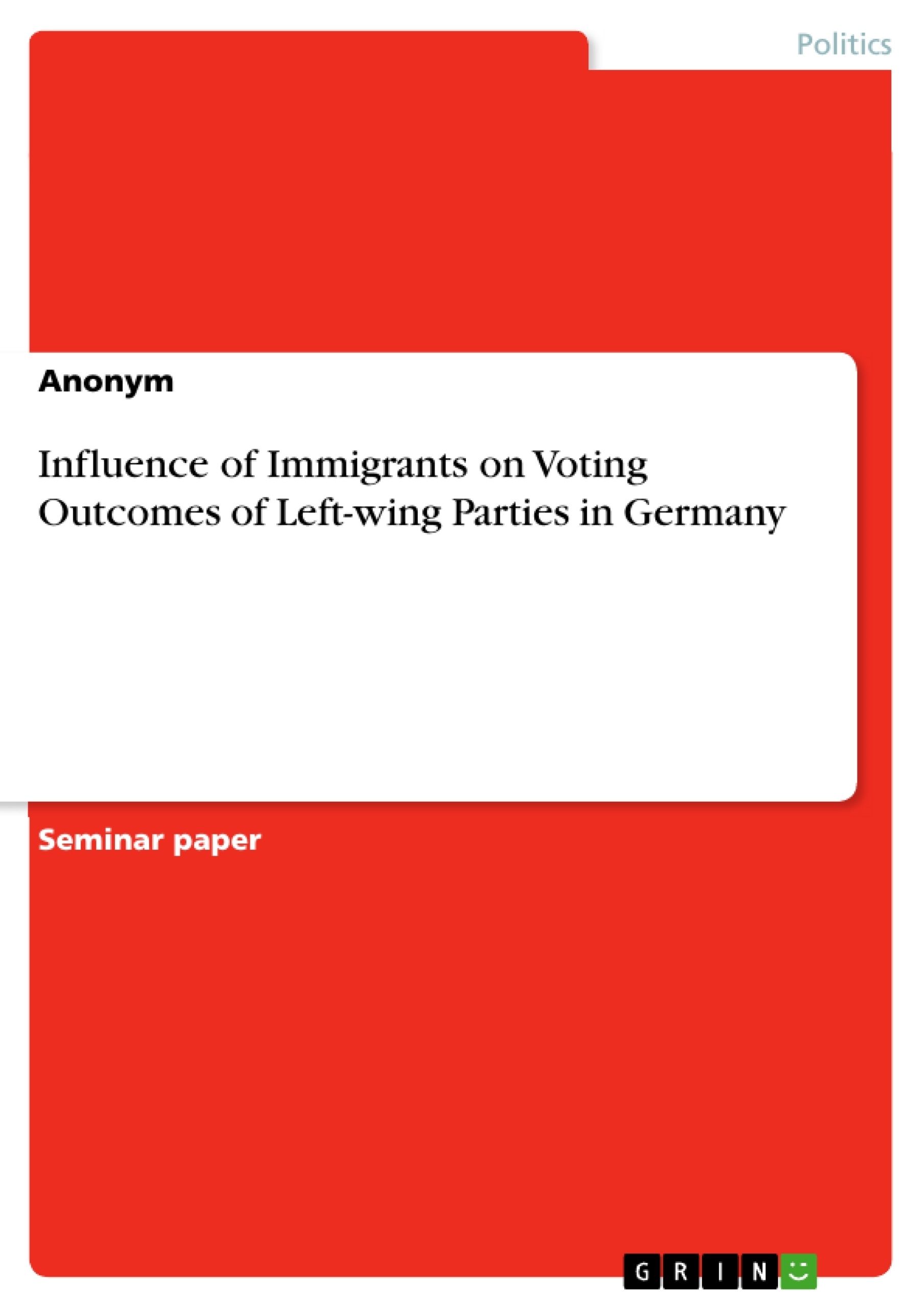Drawing on panel data from six German elections from 1998 to 2017, this study investigates the correlation between far-left positioned parties and immigration per capita using the occurring elections. Our main findings suggest a positive correlation between immigrants per capita and the voting outcomes of the far-left parties.
Given the controversy about Chancellor Merkel's open immigration policies during the peak of the refugee crisis in 2015 and 2016 in Germany, Western nations have more openly than ever responded to existing fears around immigration, favoring nationalist philosophies over more liberal ideologies. A critical determinant of the debate is driven by high xenophobia, where individuals become anxious about ethnic minorities and greater diversity, leading to the intolerance of migrants.
This has a direct impact on political stability and future electoral voting outcomes. One strain of research has focused on voting outcomes of immigrant inflows, mostly focusing on right-wing parties and the associated rise of voter bases halla2017immigration, arzheimer2019alternative. Arzheimer and Berning (2019), for instance, demonstrate that the primary motivation for voting for the Alternative für Deutschland (AfD), a newly established right-wing populist party in Germany, is the voters' negative immigration attitudes. Little research, however, has focused on the influence of voting outcomes for far-left positioned parties in Germany.
Inhaltsverzeichnis (Table of Contents)
- Introduction
- Literature Review
- Impact of Immigration
- Immigration and Left-wing Parties
- Methodology
- Data
- Method
Zielsetzung und Themenschwerpunkte (Objectives and Key Themes)
This study investigates the relationship between the number of immigrants per capita and voting outcomes for far-left parties in Germany. It aims to analyze the correlation between immigrant inflows and voting outcomes for parties that generally favor more liberal ideologies and social diversity.
- Influence of immigration on left-wing voting outcomes in Germany
- Impact of xenophobia and negative immigration attitudes on political stability and electoral outcomes
- Relationship between immigrants per capita and voting outcomes for far-left parties
- The role of unemployment and unemployment fears in shaping attitudes towards immigration and voting behavior
- The impact of social identity and self-categorization theory on attitudes towards immigration and voting decisions
Zusammenfassung der Kapitel (Chapter Summaries)
The introduction outlines the controversial nature of immigration policies in Germany, highlighting the rise of nationalist and xenophobic sentiments in response to immigration. It emphasizes the limited research on the influence of immigration on voting outcomes for far-left parties, contrasting it with the abundant studies focusing on right-wing parties.
The literature review explores the multifaceted impact of immigration, examining both the negative perceptions and fears associated with immigrant inflows and the positive efforts towards integration. It delves into the role of social identity theory and the influence of unemployment and unemployment fears in shaping attitudes towards immigration and voting behavior. Finally, it discusses the importance of immigration policies in election campaigns and the ideological stance of left-wing parties on social diversity and egalitarianism.
The methodology chapter details the dataset used, which comprises longitudinal data on German federal elections from 1998 to 2017. It describes the key variables used in the analysis, including immigrants per capita, voting outcomes for far-left parties, unemployment rate, and other control variables. The chapter outlines the chosen method of analysis, pooled ordinary least squares, and discusses the application of fixed and random effects models to account for variations across counties. It concludes by describing the Hausman test used to assess the suitability of the chosen model and the steps taken to address heteroskedasticity.
Schlüsselwörter (Keywords)
This research focuses on the relationship between immigrants and voting outcomes for far-left parties in Germany. Key concepts include: immigration, voting behavior, far-left parties, xenophobia, social identity theory, unemployment, political stability, and electoral outcomes.
Frequently Asked Questions
How does immigration affect far-left voting in Germany?
The study suggests a positive correlation between immigrants per capita and voting outcomes for far-left parties in Germany.
What role does xenophobia play in political stability?
High levels of xenophobia and anxiety about ethnic diversity can lead to intolerance, impacting electoral outcomes and favoring nationalist or extremist ideologies.
Why do voters choose far-left parties in relation to immigration?
Unlike right-wing voters motivated by negative attitudes, far-left voters may support parties that favor egalitarianism and social diversity, especially in areas with high immigrant inflows.
How does unemployment influence attitudes towards migrants?
The research examines how unemployment fears shape attitudes, suggesting that economic instability can increase anxiety regarding immigrant competition for resources.
What dataset was used for this study?
The study analyzed panel data from six German federal elections spanning the years 1998 to 2017.
- Arbeit zitieren
- Anonym (Autor:in), 2020, Influence of Immigrants on Voting Outcomes of Left-wing Parties in Germany, München, GRIN Verlag, https://www.hausarbeiten.de/document/1289868


